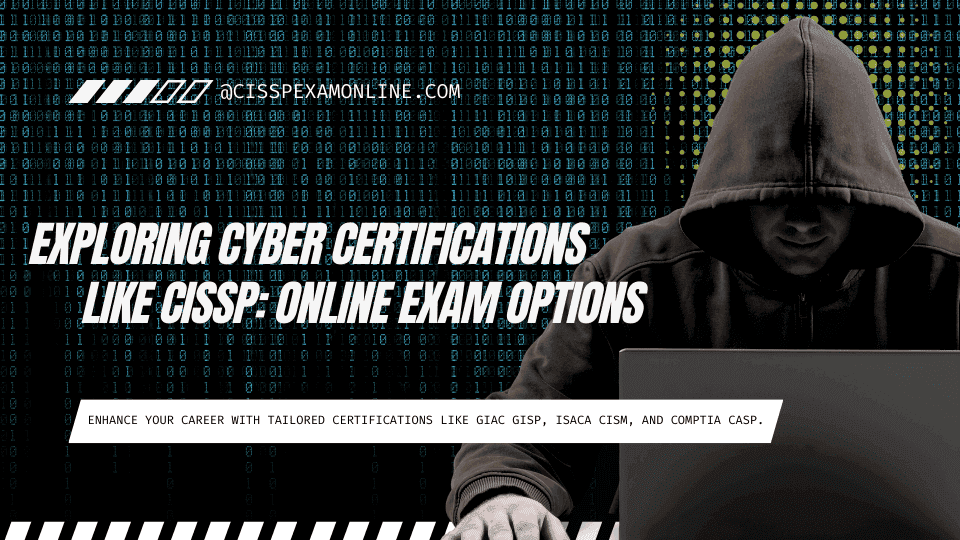Introduction to Cybersecurity Certifications
In today's rapidly evolving digital landscape, the demand for highly skilled cybersecurity professionals is at an all-time high. With cyber threats becoming more sophisticated, organizations are seeking professionals with specialized knowledge and expertise in protecting sensitive information and critical systems. Certifications serve as a benchmark for validating these skills and are highly sought after by employers and individuals looking to advance their careers in cybersecurity. ISC2 CISSP (Certified Information Systems Security Professional) is widely recognized as a premier certification in the field. but unfortunately CISSP exam is not availble online anymore.
However, several other certifications offer similar course materials and knowledge domains, providing professionals with additional pathways to enhance their cybersecurity expertise.
In this article, we will explore in detail the top certifications similar to ISC2 CISSP, including GIAC GISP, ISACA CISM, CompTIA CASP, GIAC GCIH, and GIAC GSEC. By understanding the domains, exam requirements, and industry relevance of each certification, professionals can make informed decisions to expand their skill sets and stay competitive in the cybersecurity industry.
ISC2 CISSP: A Foundation in Cybersecurity - An Overview
ISC2 CISSP is widely regarded as the gold standard certification for cybersecurity professionals. It covers a broad range of domains, including security and risk management, asset security, security architecture and engineering, communication and network security, identity and access management, security assessment and testing, security operations, and software development security. CISSP validates an individual's ability to design, implement, and manage an effective cybersecurity program. The certification requires a minimum of five years of professional experience in at least two domains of the CISSP Common Body of Knowledge (CBK), or four years of experience with an applicable college degree.
Certification Options Available With Online Exam
1. GIAC GISP: A Parallel Path to CISSP
GIAC GISP (GIAC Information Security Professional) is a certification that closely aligns with the domains covered in ISC2 CISSP. It focuses on essential areas such as access control systems and methodology, cryptography, network and communication security, security management practices, security policies, and risk management. GISP places a strong emphasis on practical knowledge and hands-on skills, allowing professionals to apply their understanding of real-world scenarios. The certification is designed to validate individuals' abilities in information security management and offers an alternative pathway for those seeking a certification similar to CISSP. GISP requires candidates to pass a comprehensive examination that assesses their knowledge across multiple domains. good thing is unlike CISSP you can take it online.
2. ISACA CISM: Mastering Information Security Management
ISACA CISM (Certified Information Security Manager) is specifically designed for professionals involved in information security governance and management. The domains covered in CISM include information security governance, risk management, information security program development and management, and information security incident management. CISM validates an individual's ability to establish and manage an enterprise's information security program, focusing on the governance and strategic aspects of cybersecurity. The certification requires a minimum of five years of work experience in information security management, with at least three years of experience in three or more CISM domains.
3. CompTIA CASP: Advanced Security Practitioner
CompTIA CASP (CompTIA Advanced Security Practitioner) is an advanced-level certification that caters to professionals seeking to deepen their understanding of complex cybersecurity concepts beyond the foundational level covered in CISSP. CASP covers domains such as risk management, enterprise security architecture, research and collaboration, integration of enterprise security, and more. This certification is designed to validate the skills necessary to conceptualize, engineer, integrate, and implement secure solutions within complex environments. CASP requires candidates to have a minimum of ten years of experience in IT administration, with at least five years of hands-on technical security experience.
4. GIAC GCIH: Defending Against Incidents
GIAC GCIH (GIAC Certified Incident Handler) is a certification that focuses on incident response and management. While GCIH differs slightly from CISSP in terms of scope, it provides professionals with a valuable skill set that complements the knowledge gained through CISSP. GCIH covers domains such as incident handling and response, network and communication monitoring, malware analysis, digital forensics, and information security fundamentals. Professionals holding GCIH demonstrate their ability to detect, respond to, and recover from security incidents effectively, making it an advantageous certification for those interested in incident response roles.
5. GIAC GSEC: Foundational Cybersecurity Knowledge
GIAC GSEC (GIAC Security Essentials) is a certification that covers a broad range of foundational cybersecurity concepts. The domains covered in GSEC include network security, access controls, security policies, cryptography, risk management, and more. While GSEC may not delve as deeply into specific domains as CISSP, it serves as an excellent starting point for individuals looking to build a strong cybersecurity knowledge foundation. GSEC equips professionals with the necessary foundational knowledge and prepares them for entry-level and intermediate cybersecurity roles. It serves as a stepping stone for individuals seeking to establish a solid understanding of core concepts before pursuing more specialized certifications.
6. CompTIA Security+
CompTIA Security+ is an entry-level certification that serves as a solid foundation for professionals entering the cybersecurity field. It covers essential topics such as network security, threats and vulnerabilities, cryptography, access control, and security risk management. While CISSP is more comprehensive and in-depth, Security+ provides a broad understanding of cybersecurity principles. It is a stepping stone for professionals seeking to gain foundational knowledge before pursuing more advanced certifications. Security+ is recognized globally and is widely sought after by employers looking for professionals with a solid understanding of cybersecurity fundamentals.
7. EC-Council Certified Ethical Hacker (CEH)
EC-Council CEH is designed for professionals interested in ethical hacking and penetration testing. Similar to CISSP, CEH covers various domains, including footprinting and reconnaissance, scanning networks, enumeration, system hacking, and web application penetration testing. However, CISSP takes a broader approach, covering additional domains such as security operations, software development security, and telecommunications and network security. CEH is well-suited for professionals seeking specialized knowledge and practical skills in identifying vulnerabilities and securing systems.
Brief Recap of Home-based Cybersecurity Certification Options
In the dynamic field of cybersecurity, certifications play a crucial role in demonstrating expertise, expanding knowledge, and advancing careers. While ISC2 CISSP remains a highly respected certification, there are several comparable certifications that cater to specific domains and career paths. CompTIA Security+ serves as an entry-level certification, providing a broad understanding of cybersecurity fundamentals. ISACA CISM focuses on information security management and is ideal for professionals involved in program development and management. EC-Council CEH specializes in ethical hacking and penetration testing, offering practical skills in identifying vulnerabilities. GIAC GSEC provides a comprehensive overview of essential security concepts, serving as a strong foundation for professionals.
How Does It Affect Your Career and What Are The Benefits?
When choosing a certification, it is important to consider your career goals, interests, and the specific domains covered by each certification. CISSP covers a wide range of technical and managerial domains, making it suitable for professionals seeking a holistic understanding of cybersecurity. Ultimately, the choice of certification depends on individual preferences, career aspirations, and the specific knowledge and skills one wishes to acquire. By obtaining a certification similar to ISC2 CISSP, professionals can validate their expertise, expand their knowledge, and enhance their career prospects in the ever-evolving field of cybersecurity.
Obtaining certifications similar to ISC2 CISSP can provide significant benefits for cybersecurity professionals. While CISSP remains a highly respected certification, complementary certifications such as GIAC GISP, ISACA CISM, CompTIA CASP, GIAC GCIH, and GIAC GSEC allow professionals to diversify their skill sets, specialize in specific areas, and enhance their career prospects. Each certification offers unique advantages and opportunities based on individual career goals and interests.
Conclusion
By carefully considering the domains covered, exam requirements, and relevance in the industry, professionals can make informed decisions to advance their cybersecurity careers. Continuous learning and professional development through certifications are essential in staying ahead in the dynamic field of cybersecurity and meeting the ever-growing demand for skilled professionals. As the cyber threat landscape continues to evolve, obtaining multiple certifications can provide professionals with a competitive edge and open doors to a wide range of career opportunities in the exciting and challenging field of cybersecurity.




